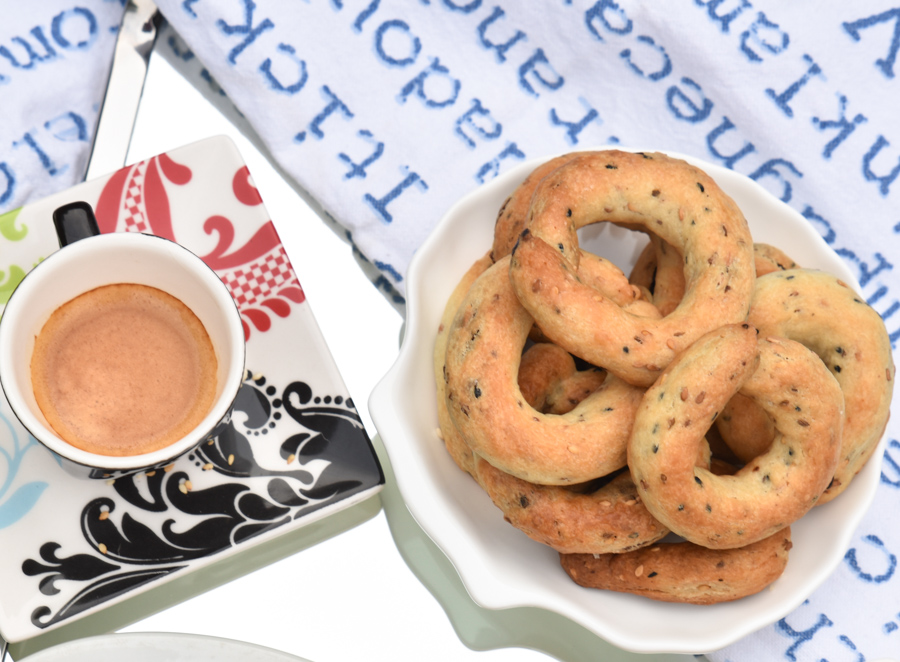
Farida’s Date Ring Kaak
Eggless, Ramadan Recipes, Vegetarian
Eid Al Adha is always a time for joyfulness, family reunions, and feasting. Every year preparations for a variety of mouth-watering dishes are held in my kitchen, where I invite family and friends and we connect together and gather around a dining table. Unfortunately, this year I was forced to spend considerable time in bed since I have been dealing with malaria. I had the intention of sharing with you at Eid a dear recipe from my mom’s kitchen who eventually learned it from auntie Farida, and since now I am way more better, here is my intake for a special Eid dessert:”Date Ring Kaak”.
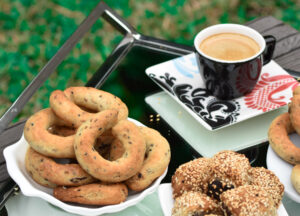
Farida’s Date Ring Kaak
The most two common Kaak in Lebanon fall into two categories: a handbag shaped sesame kaak, and a sweet kaak we dip with milk for breakfast. But as you look around, you will realize that kaak can come in many forms in the Arab world; so many recipes feature the same major staples — butter, ghee or oil sugar, flour, spices, sesame — and still, the variations are endless. You will notice a few commonalities in those recipes, but the end results could not be more different. Another great example to consider is the “Date Ring Kaak” from Palestine that goes often by the name “Kaak Al Asawer” which literally translates to bracelet cookies.
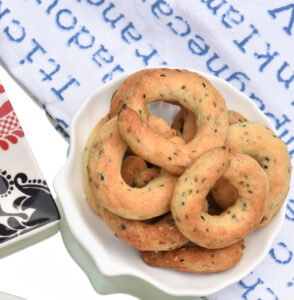
The practice of bringing edible sweet gifts to family at Eid vacation is a big part of Arab culture. Every Eid while growing up in Lebanon, I eagerly awaited for those “Date Ring Kaak” that would inevitably be gifted by auntie Farida. I was always ecstatic when she paid us a visit, holding those cookies with her hands wrapped in cellophane and tied with a red satin ribbon. They are not your ordinary cookies, but would describe them as sort of crispy and fragrant bites made with a spicy dough that surrounds an enticing date filling; in short, the contrast of crisp kaak and dense dates is magical, and a must have if you are a date lover like most Middle Easterns including me, no matter how it is served, we have a close relationship with dates, and these “Date Ring Kaak” will never fail to impress you.
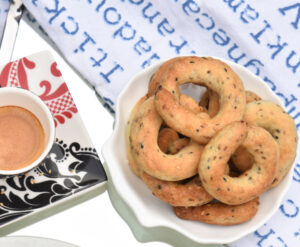
By time my mom learned the recipe from auntie Farida, and baked them throughout the year, but it was at the holiday season that we raved about most. And from the day till now those kaak are known at our house as “Farida’s’ Kaak”. This year I made my mind to give my readers a taste and smell of those old days, well it didn’t work efficiently to share it on Eid because of my illness, but it is never too late, and I would consider those ring kaak a breakfast cookie, they are not only meant for a holiday cookie platter, but they really go with a cup of coffee or tea —you can imagine my delight when I baked them, the smell coming out of the oven is like being in Lebanon at my mom’s house again— memories flood me now and I miss my mother and our holiday rituals that are full of life and warmth.
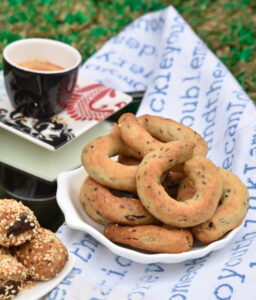
Homemade cookies will always impress, and while there are a few steps to make this “Date Ring Kaak” recipe, it’s an easy, recipe, has so much flavor and can be made ahead of time and freezes well after baking! Start the dough the day before, mix together the flour, seeds, spices and hot ghee and oil. Let sit overnight, allowing the flour to absorb the fat content. This is a crucial step for best results.
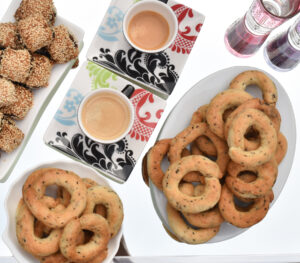
Temperature actually makes a pretty significant difference in the Date Ring Kaak outcome!
Most cookies often bake at 350 °F/ 175 °C , but this is not the case here. When you bake a batch of “Date Ring Kaak” over a low heat, you automatically need to extend the baking time, but you will end up only to find that your kaak are hard instead of being crispy; on the other hand, bake the kaak over a high temperature and they will cook much faster and will achieve a bit of crispness on the outside while remaining soft and delicate on the inside which is exactly what we want, so cranking the heat to the highest your oven can go is ideal for baking those “Date Ring Kaak”. At first, position rack in the lower third of the oven (as close to the bottom of the oven) and bake for 4 to 5 minutes, roll one over and see that it’s just slightly brown on the bottom, then you need to move or have a rack closer to the upper heating element and bake for 9 to 10 minutes to a pale golden color.
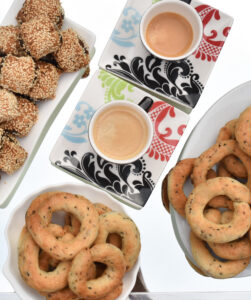
Spices and Seeds
- Mahlab, or Mahleb: an aromatic white spice, used in the Middle East for baked goods.
- Anise seeds: a spice that is native to the Middle East! It has a mild fragrant aroma and a sweet taste that is similar to licorice.
- Dried fennel seeds: are the dried seeds of the fennel herb, highly aromatic, and the flavor is slightly sweet.
- Sesame seeds: Sesame seeds are considered to be the oldest oliseed crop known to humanity, a common ingredient in various cuisines. They provide food with a nutty flavor and a little crunch.
- Nigella seeds: have long been a staple of cuisines around the world, used throughout the Middle East, North Africa and India, often incorporated in bread making; the tiny black seeds contain surprising health benefits, plus their sharp peppery aroma adds a broad flavor profile to baked goods.
And now let’s get started
In an oil-free skillet add the anise and fennel seeds and cook over medium heat, stirring all the time just to bring out their earthy flavor, about one minute. Leave to cool down a bit, then roughly crush with a mortar and pestle. Place the all-purpose flour in a ceramic or glass bowl, add the anise-fennel mix, mahlab, sesame seeds, black seeds and crushed mastic, stir well.
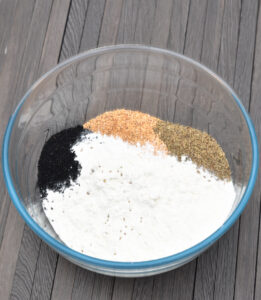
Heat the ghee and oil in a saucepan to a frying temperature, 350 °F/ 175 °C, then add to the flour mix, don’t touch to prevent burning your hands.
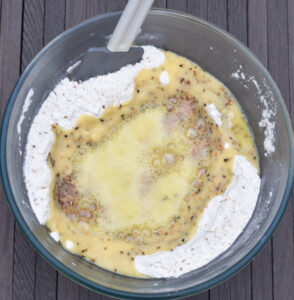
Use a spatula to homogenize the flour and ghee together, leave overnight covered with cling film, or a minimum of four hours, allowing the flour to absorb the ghee.
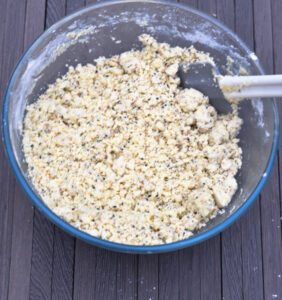
Return back to the flour mix that has rested overnight, add the powdered sugar, baking powder and instant dry yeast (you can integrate it right in the dough without proofing it with water first). Heat the milk to lukewarm and add to the dough. Mix with your fingertips until a malleable ball of one texture is formed, cover one more time and let it rest for 45 minutes. Pull open the dates and release the pits by hand. Use a paring knife cut the dates lengthwise into strips. Make them as narrow as possible. Then try to mix them with your hands, and you will notice the date strips will stick together to a pliable dough, which is exactly what we want. Add the cardamom powder, ghee and orange blossom water. Mix well to integrate everything together.
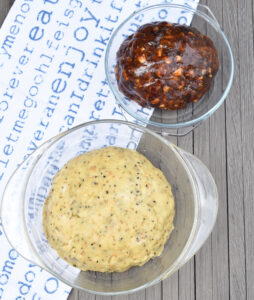
Divide the date to 1.5inch/4 cm balls, then roll with the palms of your hands to an even rope-shape like that is 4 inches/10 cm long.
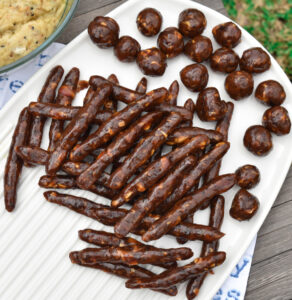
Divide the dough to 2 inches/ 5 cm balls, take one ball at a time and form into a fat cylinder about 5 inches /12 cm long, use the palm of your hand to flatten the dough to a width of 2 inches/5 cm long, center the narrow log of the date on the dough.
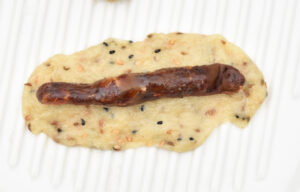
Draw the dough around the filling to enclose it, making a long cylinder. Roll the cylinder under the palms of your hands or on a countertop and bring it back and forth to lengthen it to 5.5 inches/14 cm long rope-shape like (be careful to keep it an even thickness all the way to the ends) as you work.
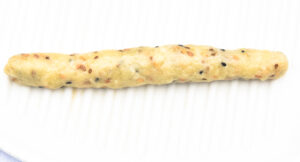
Pinch the end of the elongated rope together, forming a circle. Repeat with the remaining date and dough.
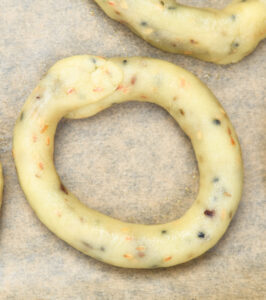
Place on parchment lined cookie sheets, keep some space between one kaak and another. Bake in the lower third of the oven, for 4 to 5 minutes, roll one over and see that it’s just slightly brown on the bottom, then transfer to the top third rack of the oven and bake to a pale golden color, about 9 to 10 minutes. Keep an eye on your oven, and remember that ovens are different!
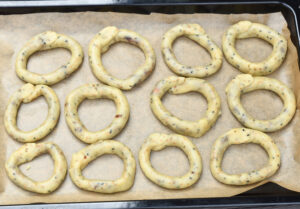
Remove from the oven, leave to cool down, and transfer to a serving plate, enjoy with a cup of coffe or tea. Sublime!
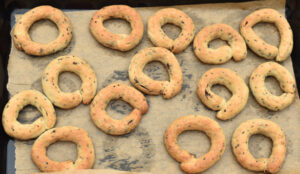
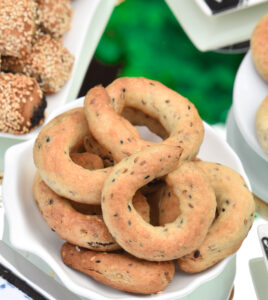
If you have been raised in Lebanon or any part of the Arab world, then let your nostalgia wash over you when you bite into these phenomenal kaak recipes.
- Lebanese Streat Bread/ Kaak Al Asrieh
- Lebanese Milk Kaak
- Lebanese Sweet Kaak
- Kaleeta/Northern Lebanese flat Kaak
When baking Date Ring Kaak, follow your intuition than sticking to the precise time of baking. I’ve provided you with the time needed to bake, but advice you to use the baking time as a guide, check a minute or two before. You may want to bake one first, to find out exactly the right time for your oven. Once you’ve got it down, you continue with the rest at the same rhythm.
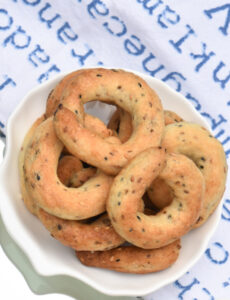
1 cup equivellant to 250 ml
Ingredients
- 4 cups / 800 grams / 1lb 12 oz. all- purpose flour
- 3/4 cup ghee
- 1/2 cup sunflower oil or a mix of sunflower and olive oil
- 2 tablespoons anise seeds
- 2 tablespoons fennel seeds, optional
- 2 tablespoons Nigella seeds (habit albarakeh)
- 2 tablespoons toasted sesames
- 1 teaspoon mahlab
- 1/2 teaspoon baking powder
- 1 leveled teaspoon instant dry yeast
- 1 cup powdered sugar
- 3/4 cup milk (liquid), you may need to add a bit more, depending on the flour brand
For the filling
- 700 grams / 1.5 lb Medjool or Omani dates
- 2 tablespoons ghee
- 1 leveled teaspoon cardamom powder
- 2 tablespoons orange blossom water
- 1/2 teaspoon mastic gum, crushed with a pinch of sugar
Directions:
- In an oil-free skillet add the anise and fennel seeds and cook over medium heat, stirring all the time just to bring out their earthy flavor. Leave to cool down a bit, then roughly crush with a mortar and pestle.
- Place the all-purpose flour in a ceramic bowl, add the anise-fennel mix, mahlab, sesame seeds, black seeds and crushed mastic, stir well.
- Heat the ghee and oil in a saucepan to a frying temperature, 350 °F/ 175 °C, then add to the flour mix, don’t touch to prevent burning your hands, use a spatula to homogenize the flour and ghee together, leave overnight covered with cling film, or a minimum of four hours, allowing the flour to absorb the ghee.
- The second day: Position rack in the lower third of the oven (as close to the bottom of the oven), preheat to 500 °F/ 260 °C ( or the highest setting of your oven). Line two baking sheets with silicone liners or parchment paper.
- Return back to the flour mix that has rested overnight, add the powdered sugar, baking powder and instant dry yeast. Heat the milk to lukewarm and add to the dough. Mix with your fingertips until a malleable ball of one texture is formed, cover one more time and let it rest for 45 minutes.
- Meantime, prepare the date filling: Pull open the dates and release the pits by hand. Use a paring knife cut the date lengthwise into strips. Make them as narrow as possible. Then try to mix them with your hands, and you will notice the date strips will stick together to a pliable dough, which is exactly what we want. Add the cardamom powder, ghee and orange blossom water. Mix well to integrate everything together. Divide the date to 1.5inch / 4cm balls, then roll with the palms of your hands to an even rope-shape like that is 10 cm long.
- Shaping the kaak: After 45 minutes have passed, return back to the dough and divide it to 2 inches / 5 cm balls, take one ball at a time and form into a fat cylinder about 5 inches/12 cm long, use the palm of your hand to flatten the dough to a width of 1.5 inches/ 3 cm long, center the narrow log of the date on the dough; draw the dough around the filling to enclose it, making a long cylinder. Roll the cylinder under the palms of your hands to lengthen it to 5.5 oz/ 14 cm long rope-shape like, or roll it on a counter top back and forth (be careful to keep it an even thickness all the way to the ends) as you work. Pinch the end of the elongated rope together, forming a circle. Repeat with the remaining date and dough.
- Bake: Place on parchment lined cookie sheets, keep some space between one kaak and another. Bake in the lower third of the oven, for 4 to 5 minutes, roll one over and see that it’s just slightly brown on the bottom, then transfer to the top third rack of the oven and bake for 9 to 10 minutes to a pale golden color. Keep an eye on your oven, and remember that ovens are different!
- Remove from the oven, leave to cool down a bit, and transfer to a serving plate, enjoy with a cup of coffee or tea. Sublime!
- Storage: Store in an air-tight container and they will last for 10 days. Remember, air is the enemy and will draw out any moisture it can find. If you’re not planning to inhale all the cookies within two or three days, let the cookies cool down before storing them in a sealed container in the freezer. They’ll keep for 2 months.
Hungry for more date recipes, we got you covered
- Date and Nut salami
- Maamoul Mad Bil Tamer/ Lebanese Date Bars
- Tamara Date Filled Ghraybeh
- Date Maamoul
- Date Walnut Bread
- Banana and Date Bread with Tahini and Carob Molasses
- Date Filled Ghraybeh
- Banana Date Smoothie
- Couscous Salad with Dates
- Date and Goat Cheese Salad
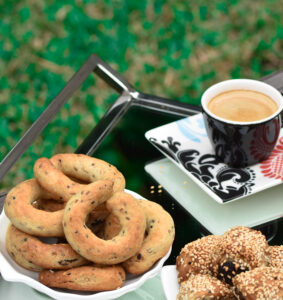
Thank you to all the readers who purchased “Hadia, Lebanese Style Recipes”. If you have a minute to spare, please rate and review the book on Amazon. We would like to know what you think! Here is the link to AMAZON
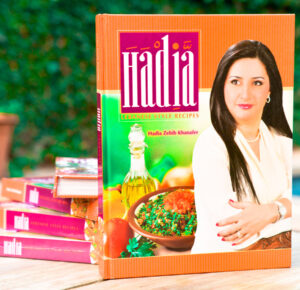
If you make "Farida's Date Ring Kaak", leave a comment below, or share your pictures on Facebook! I would love to see your creations!! Hashtag, #Hadia’s lebanese
About Chef
Hadia Zebib
I am Hadia, the face behind Hadia’s Lebanese Cuisine. I grew up in Beirut Lebanon and I currently reside in Kinshasa, Congo with my husband and my three adorable sons, ...
Read more about this chef..

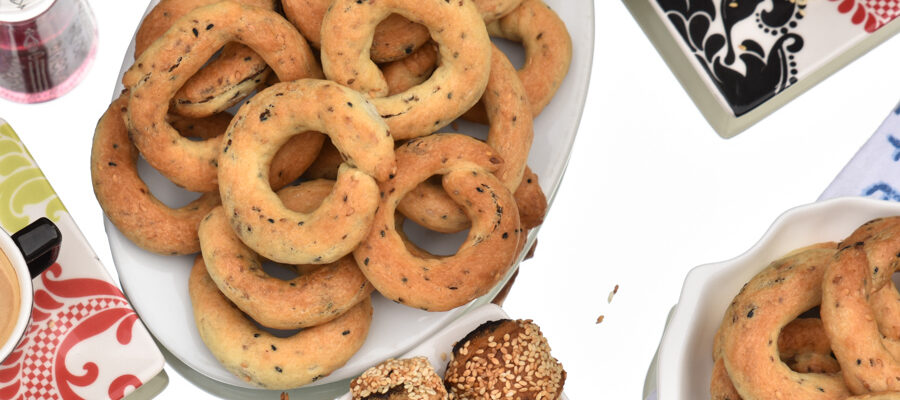
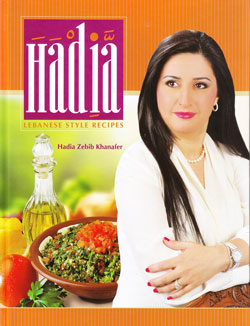
No comments yet.